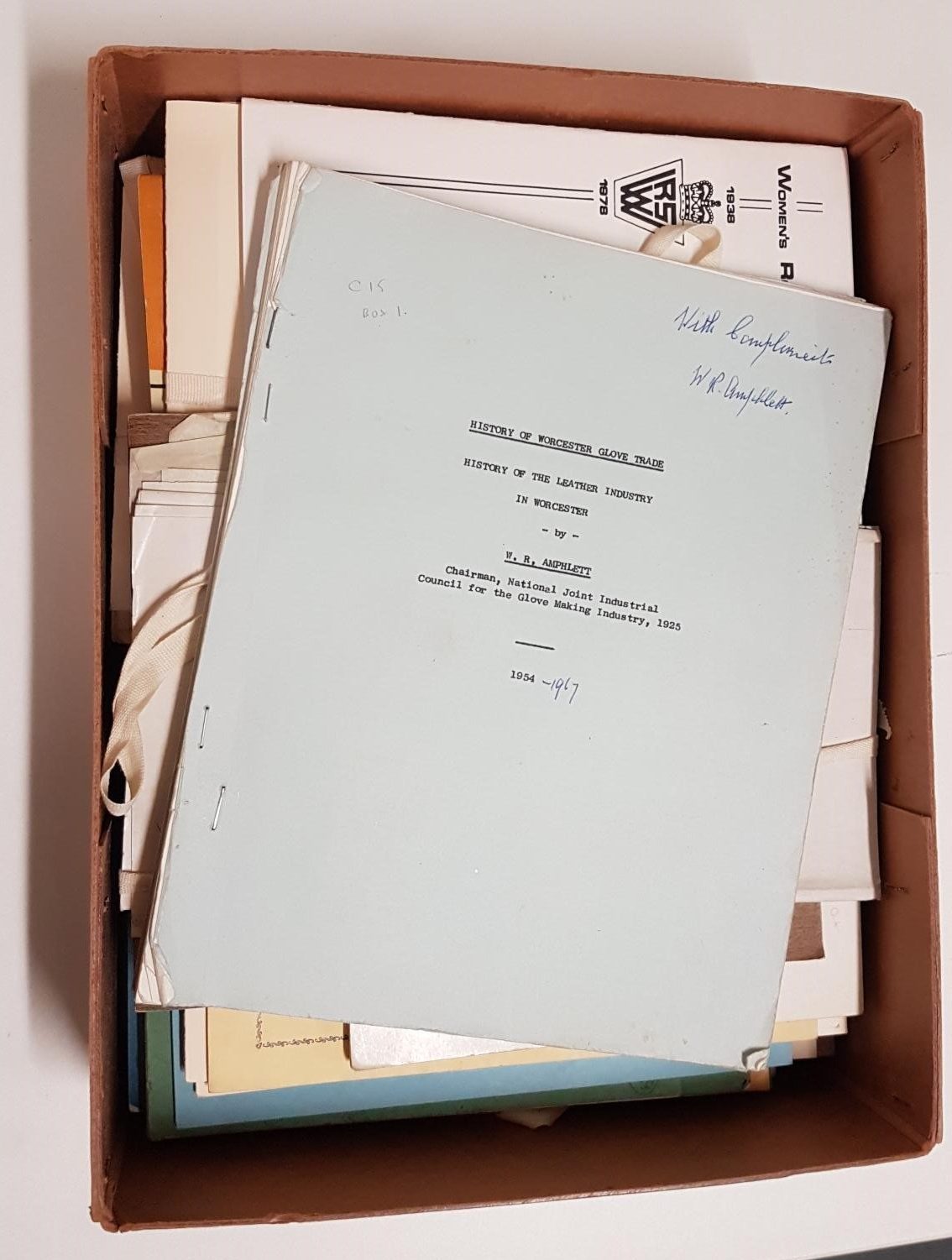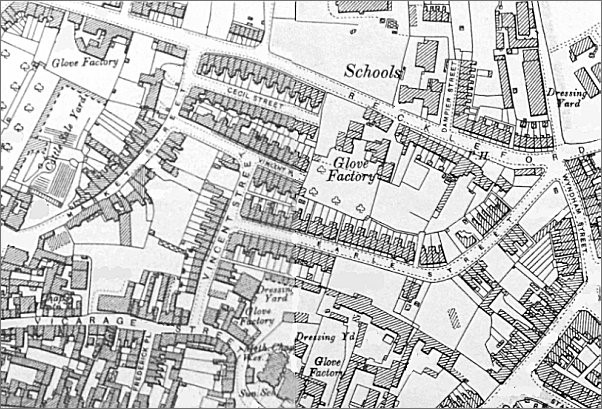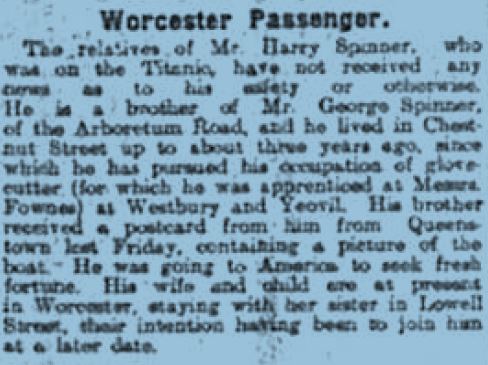Titanic: Henry John Spinner – Third-class
- 13th May 2021
Mr. Henry John Spinner (also known as Harry) from Worcester, was a glover travelling in third class on the Titanic to Gloversville, near New York in America, probably to work there. Aged 32, he had been born in 1880 in the Arboretum, Worcester where he had lived with his family before later moving with his new wife to Yeovil. He boarded at Southampton as a third-class passenger and died in the sinking of the Titanic. However, his body, if recovered, was never identified.
Henry’s family
Henry was born on 26th April 1880. Photographs show him as a tall slim gentleman with a large moustache. His father was a glove cutter and Henry became a glove cutter too. Henry’s Grandfather Edmund, born in St Martins Worcester in 1817 had also been a glover. And his great grandfather, Joseph (born 1785) was a leather worker living on Tallow Hill in 1851, so leather work was very much in Henry’s blood.
The nineteenth century gloving and leather trades occupied whole families as it did with the Spinner family. A man might be a glove cutter, which George was, and his sons were apprenticed from the age of 14. According to his brother, Henry apprenticed at Messrs Fownes as a leather cutter before working in Worcester, then Westbury in Wiltshire and Yeovil, Somerset. The man’s wife and daughters usually sewed gloves working from home, although in photographs from the Fownes factory in Worcester show many women working there outside of the family.
The Spinner family must have moved to Lower Chestnut Street soon after it was built in 1879 and soon after Henry’s baptism on 27th June 1880, when his parents lived in Alma Lane near St Stephen’s Church on Droitwich Road Worcester. The family were listed at Lower Chestnut Street (Henry’s military papers show it was number 50) by the 1881 census.

Glovemaking in the archives (photo Sarah Dentith)
As a child Henry was a witness to a Walter Harrison of nearby East Street who was accused of being drunk and disorderly in the Berrows Worcester Journal and Worcester Chronicle in August 1895. Henry stated the local boys in the street were hitting the defendant on the back and calling him names, but the landlord of the Foresters Arms said he wasn’t that drunk and the case was dismissed.
According to Encyclopedia Titanica at the age of 15 Spinner had rescued a young boy from drowning when he dived into the Worcester canal. An excellent swimmer, he had won trophies and medals for swimming.
Also known as Harry, Henry became a soldier. Having enlisted with the Royal Marine Artillery on 30th November 1900, by 1901 he was serving in Portsmouth, described as 5 feet, 9 and a half inches tall. Henry served in the Royal Marines during the Russo-Japanese War when he was stationed on H. M. S. Orion in the China seas. He left the Royal Marines in 1905 and returned to Worcester where he returned to the gloving industry.
By 1911 Henry’s widowed father had moved in with his now widowed sister Annie Garrard in 12 Wolverton Road. At the age of 69 he was still working as glove cutter. 4 of Annie’s children were also old enough to be employed in the gloving industry.
Henry Spinner had brothers George and Albert and sisters, Emma, Annie, and Elizabeth. Spinner’s brother George jnr (born 11th November 1866) became a Glove Cutter, just as his father had been. By 1901 his brother George lived with his wife Sarah and 4 children at Ashcroft Road, Worcester. In 1911 George and Sarah lived without their children at 28 Arboretum Road where he was interviewed by Berrows Worcester Journal when his brother went missing from the Titanic. He still lived there in 1939, a widower by then, still working as a Glove Cutter. Henry’s sister Emma (born about 1865) was a machinist in 1881 before she emigrated to New Zealand at the age of 18 with her mother’s brother Walter and his 10 year old daughter. His sister Elizabeth (baptised 29th December 1872 at St Stephens) and sister Annie who moved around the corner, both became gloveresses. Albert (born 1878) became a printer and by 1901 was a boarder at New Street in Worcester.
Gloving
The glove industry was historically important in Worcester from as early as the 1300s when New Street in Worcester was called Glovemakers Street. The export of leather gloves was so important to Worcester’s economy that the import of gloves was made illegal in 1400s when the Worcester Guild of Glovers was established. In the 19th century the industry developed in Worcester perhaps as the city’s traditional industry of broadcloth declined and fashion for leather gloves increased.

Map from Yeovil thanks to Bob Osborn at www.yeovilhistory.info
Worcester’s gloving industry reached its peak between 1790 and 1820 when 150 manufacturers of gloves employed over 30,000 people in and around Worcester. At this time nearly half of all gloves in Britain were made in and around the city of Worcester. By the middle of the 20th century, only a few Worcester gloving companies survived due to fashion changes and free trade. Dent Allcroft and Co, and Fownes became the big glove manufacturers. Dent Allcroft and Co, on Palace Row Worcester established by John Dent in 1777 had 900 employees by the 1900s. Fownes Brothers and Co., Inc. was established in 1777 by John and Thomas Fownes in Worcester. They employed perhaps 136 males in Worcester in 1903, with other factories including one at Yeovil, one in France and eventually one in Gloversville America.
Henry’s Marriage and move to Yeovil
In 1907 the marriage register for St Stephens Church in Worcester shows Henry marrying Harriett Alice Walker at the same church where they had both been baptised (she on 31st August 1880). Her parents Alfred Walker and Harriett Eliza Fudger had lived in Melbourne Terrace then, but by the 1901 census they had moved to 16 Lowell Street, just round the corner from Henry’s family in the Arboretum.
Harriett’s father was a china gilder for one of the porcelain companies in the city, another important trade in Worcester. Her sisters were employed in these two big industries in Worcester. Her older sister Cecila was a gloveress, Harriett herself was a glover machinist while sisters Lilian and Jessie were china burnishers following their father into the porcelain industry. She returned to this house in Lowell Street in 1912 when husband Henry Spinner left on the Titanic. She was preparing to join him later in America. However, when he died on the Titanic she did not end up leaving Worcester, and she died in the city on 23 September 1949 having lived at 383 Ombersley Road, (according to her probate) leaving her effects to her now married daughter Alice Maud Winifred Smith (nee Spinner).

Spinner census 1911 Crown Copyright
Henry’s brother told the Berrow’s Worcester Journal that the couple had been in Westbury or Yeovil area for about 3 years before the Titanic sailed (since about 190). Westbury was at one time home to five glove manufacturers, although all have since closed. Westbury had a glove making industry since about the same time as the opening of the railway in 1848. One of the biggest gloving manufacturers there W. L. Jefferies, established in 1883 was taken over by Dent Allcroft & Co. Ltd in which in 1936, which also had a factory in Worcester. In 1915 there were still around 500 outworkers for the gloving firms in Westbury. Fownes were among the last of the Yeovil glove manufacturers. They were listed as glove manufacturers of Mill Lane trading estate in Kelly’s directories until 1974 when they moved to Warminster. By 2014 Dent and Fownes amalgamated.
Henry and Harriet moved to Yeovil, which was also important in the gloving trade and leather industry. In the 1720s Daniel Defoe wrote of Yeovil “Its main manufacture at this time is the making of gloves”, and the gloving industry is of such significance that Yeovil Town. Here, their daughter Alice Maud Winifred was christened on 18th September 1908 (born on 25th August) at St John’s church. The family were living at 26 Vincent Street in 1908. Vincent Street was built for glove-trade workers by William Tucker in the 1890s who was also a glover and ran the Glovers Arms. He built several streets in Yeovil, named for his family including Vincent Street named after his wife’s maiden name.
By the time of the 1911 census, Henry, Harriett and two-year old Alice had moved to Glenville Road. Henry gave his occupation as a glove cutter at a glove manufactory. According to Bob Osborn writing on yeovilhistory.info Henry was noted as a “valued playing member and committee man” of Yeovil Town Football Club, which is still known by the nickname “The Glovers”. As a child, Henry had been fined by police in Worcester in 1899 for playing football in the streets his friends and causing a disruption.
The Adventure
Henry’s brother confirmed that while Henry took his trip on Titanic, his wife and child were staying at her parents’ house in Lowell Street in the arboretum. Harriett and their child had expecting to travel out to America to join him there later. George had received a postcard from Henry brother posted at Queenstown, with a photograph of the Titanic, at the same time as Francis Millet sent his letter which is in the Worcestershire Archives.
Henry’s third-class ticket on the Titanic was Number 369943 and cost £8 1s. his entry on the manifest for the Titanic showed he was on his way to Gloversville America. Gloversville had been known until 1828 as “Stump City”. This became the hub of the United States’ glovemaking industry, with over two hundred manufacturers such a change in the market led to the recruitment of key male operatives and emigration of many male workers from Worcester. Fownes had arrived in America in 1887 with a sales office in New York City, and built manufacturing facilities in Gloversville America in 1900. Spinner was one of these. It is impossible to know which company Spinner worked for in either Worcester, Westbury, and Yeovil and where he intended to work in America, but it is interesting to speculate that Fownes, where Henry’s brother stated he had apprenticed in glove cutting, also had factories in each of these places.

Worcester News 26 April 1912 thanks to Newsquest
Many third-class passengers or ‘steerage passengers’ leaving on the Titanic, like Spinner, were looking to make new lives in the United States and Canada, with the promise of new jobs or to look for work. They paid £7 (£698 today) for their ticket. They were from many nationalities and ethnic groups. Spinner was an English passenger travelling alongside Irish, Scandinavian Central and Eastern European, and passengers from the Lebanon and Hong Kong. There were many families travelling together and mothers travelling alone with their young children to join their husbands, who had already gone to America to find jobs, as Spinner was doing.
They were confined to their own area of the ship, unable to visit other areas, but the White Star Line offered their steerage passengers small luxuries to compete with other lines. They had their own dining facilities, and were served meals on board rather than being expected to bring their own food, they had their own cabins with beds, mattresses, blankets, pillows, electric lights, heat, and a washbasin with running water, rather than dormitory-style sleeping areas, and two public bathtubs were also provided. Passengers played chess or cards in the third-class common room or walked along the poop deck.
Henry Spinner’s family was still waiting for news of him in late April 1912, but his body was sadly never discovered. According to the investigation published in the Worcester News many third-class passengers failed to make it to a life boat since these were near the first class deck, so may have just jumped into the sea hoping to be saved. Henry’s brother George of Arboretum Road was waiting for news when he spoke to the Berrows Worcester Journal.
In June Henry was listed in the register of deceased passengers on the Titanic with the date of death listed as 15th April, and he is mistakenly given the job title of Grocer, with a previous abode of Worcester. The cause of death is “supposed drowned” and place of death given as “lat 41.16’N long 50.14’ W”
Museums Worcestershire have an exhibition, Titanic: Honour and Glory, running from Monday 17 May – Saturday 11 September. Our Titanic letter will be part of this.
NOTES:
Berrows Worcester Journal April 27, 1912, Berrows Worcester Journal August 1895, Birmingham Daily Gazette, April 16 1912 – April 29, Worcester Chronicle August 1895
Covins, Frederick, The Arboretum story : a social and historical record of the Arboretum area of Central Worcester (1991)
Lyes, DC, The Leather Glove Industry of Worcester in the nineteenth century (1973)
Turner, F. (2016) ‘The defiant English glove revival.’ X International Fashion Conference: Fashion On The Move – Rethinking Design. University of Navarra, Pamplona, Spain. 20-21 April 2016. Unpublished conference notes.
Ancestry.co.uk, bbc.co.uk/ahistoryoftheworld/objects/, britannica.com/place/Gloversville, dailybritain.wordpress.com/tag/fownes-of-worcester/, en.wikipedia.org/wiki/Gloversville,_New_York, encyclopedia-titanica.org, FindAGrave.co.uk, fownesbrothers.com/our-history, geni.com/people/Henry-John-Spinner/, longlongtrail.co.uk, mikeredwood.com/all-about-gloves/, pittards.com, sheepskin.co.uk, thelaverton.co.uk/room/life-in-victorian-westbury/, Visionofbritain.org.uk, wikipedia.org, british-history.ac.uk/vch/wilts/vol8/pp168-172, whitehorsenews.co.uk/blog/2019/02/12/history-of-the-gloving-industry-in-westbury/, yeovilhistory.info
Post a Comment